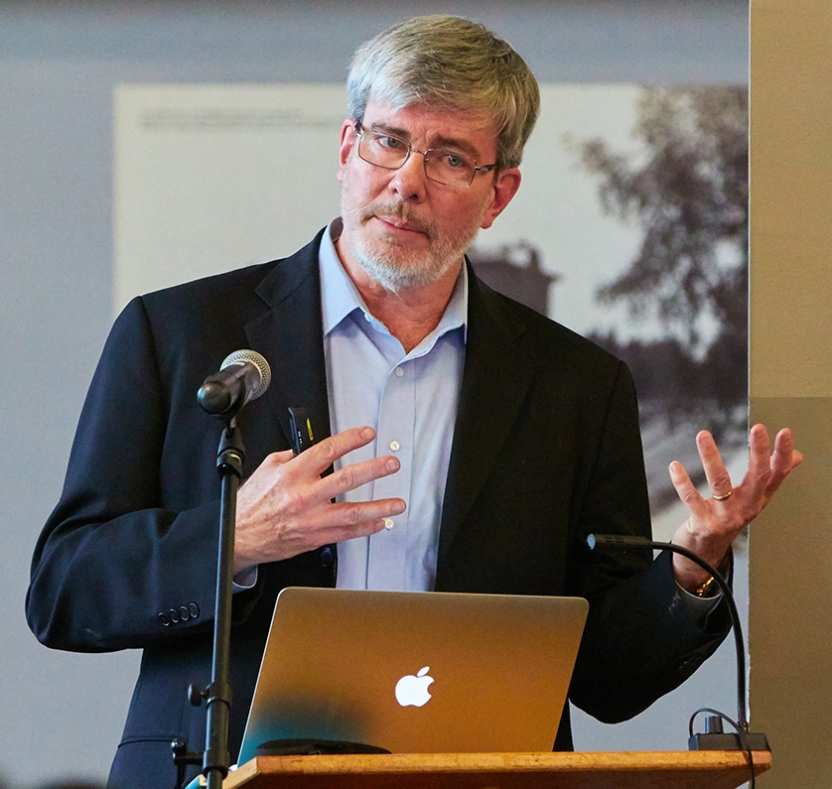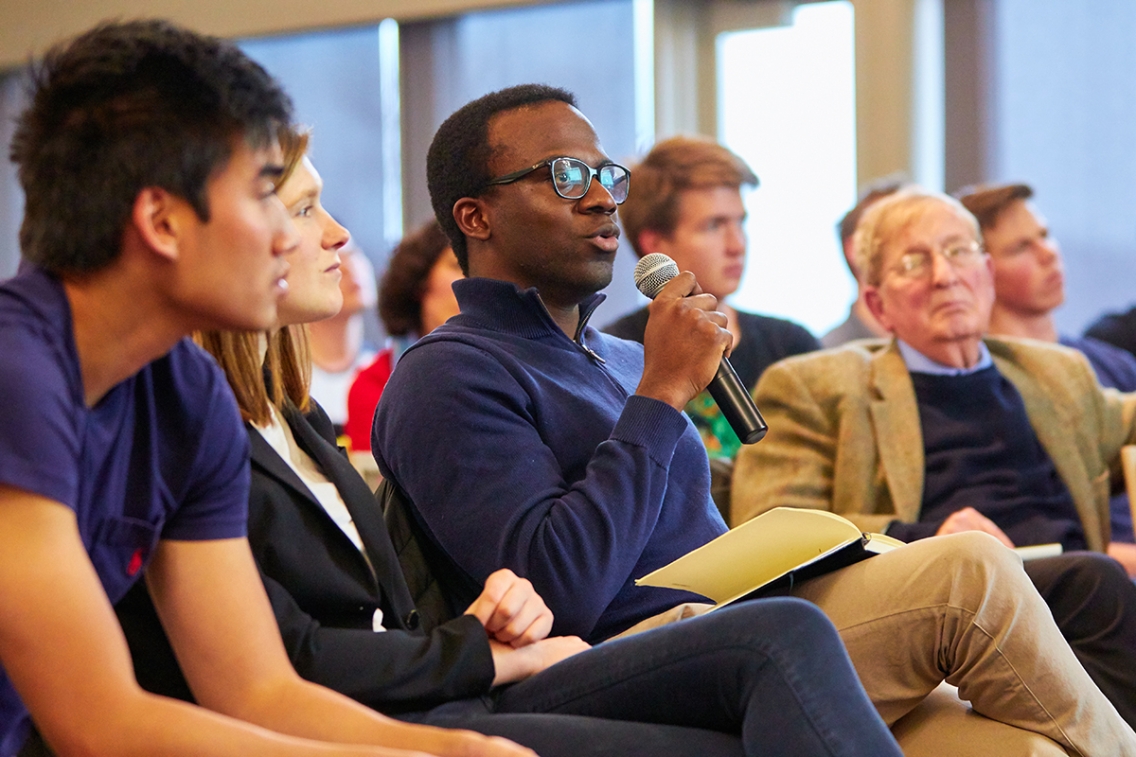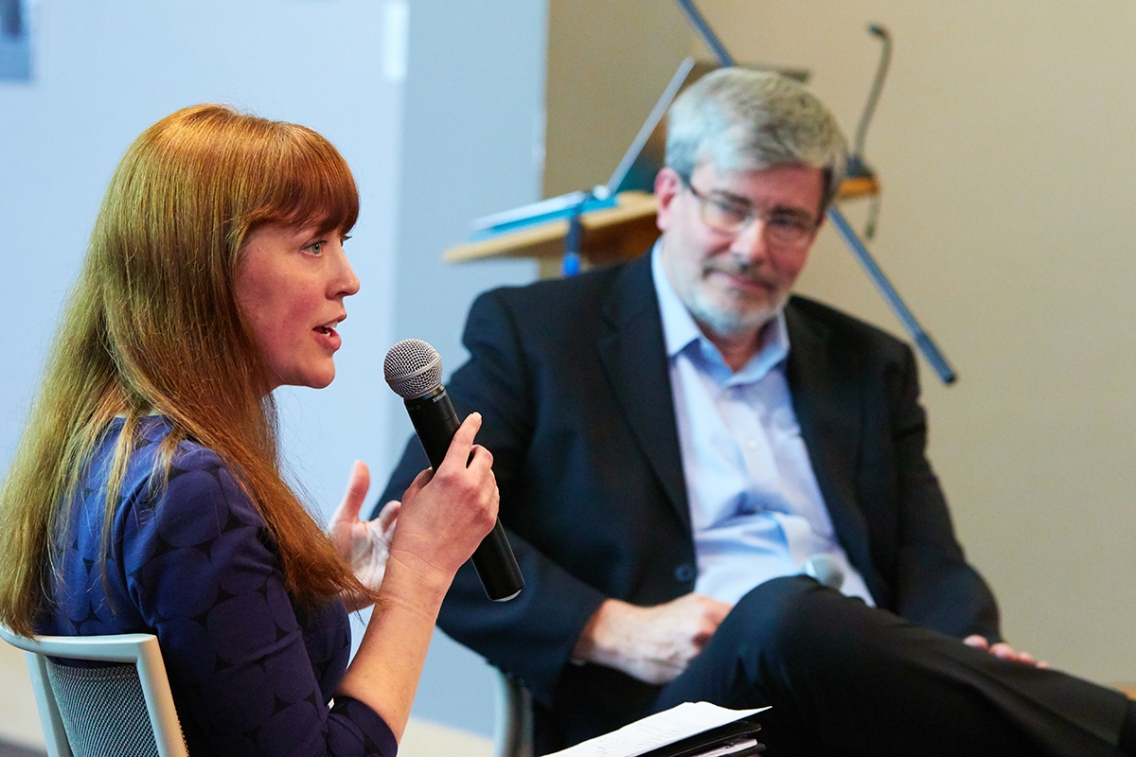Richard Sander Speaks on the Challenges of Discussing Affirmative Action

MIDDLEBURY, Vt. – Colleges and universities should be more transparent with admissions and student outcomes data to permit researchers to better understand the value and impact of preferences used in admissions, Richard Sander, a UCLA law professor, told an audience of about 130 students, faculty, and staff gathered in Kirk Center Tuesday afternoon.
Sander, who has researched the effects of preferences in law school admissions, spoke for about 30 minutes on the difficulties of discussing affirmative action in higher education before he was joined by Associate Professor of Economics Caitlin Myers, who engaged Sander in a series of questions she had gathered from the campus community. Numerous other questions followed when Sander and Myers opened the floor to the audience.
Sander, who was invited by the College Republicans organization, noted that one of the first hurdles in creating a meaningful discourse about admissions preferences is that there is little agreement on what to call those preferences. Liberals tend to use the term “affirmative action” while conservatives label them “racial preferences,” he said. In every state that has banned racial preferences in college admissions, there has been a “pre-fight” over what to call the metrics. “Most Americans support the idea of affirmative action,” he said. “It consistently gets majorities in polls, whereas large majorities consistently oppose the use of racial preferences in college admissions.”

Nosagie Asaolu ’18 questioned Richard Sander a question following his talk at the Kirk Center on April 3.
Sander continued: “From my point of view, affirmative action does mean something broader than racial preferences. Affirmative action is about trying to level the pathways into higher education or whatever sort of institution we’re talking about. It’s about trying to make sure that standards of admission are fair to everyone, that one reexamines those and sees what unintentional types of screening are occurring. It involves trying to do outreach, trying to make sure that one isn’t simply cultivating an old-boy network, but actively trying to go into communities that are generally underrepresented. So, I’m not an outright opponent of racial preferences, but I’m definitely a very strong supporter of affirmative action.”
He said three major obstacles stand in the way of further discussion of preferences in college admissions, including availability of state data, institutional fear of litigation, and what he described as the “first mover” problem, in which no school wants to be the first to discuss their own challenges with preferences in admissions.
Sander, coauthor of Mismatch: How Affirmative Action Hurts Students It’s Intended to Help, and Why Universities Won’t Admit It, with Stuart Taylor Jr., has been studying racial and socioeconomic divisions in the U.S. for many years. After graduating from Harvard in 1978, he joined the federal Vista program and worked for a small neighborhood housing group on Chicago’s South Side. While organizing tenant unions and building receiverships, he was deeply impressed with the work of the South Shore Bank, an experimental, community-development bank owned by churches and foundations. Sander secured funding from three federal agencies and, with the Woodstock Institute, completed the first detailed study of the bank. South Shore Bank was widely imitated as an instrument for community revitalization in other urban areas over the next two decades. He later continued his education at Northwestern University, earning degrees in law and economics (JD and PhD).

The speaker said his work on “mismatch,” the idea that unequal preparation among students can put less-prepared students who were admitted through admissions preferences at a significant disadvantage, started “as an effort for me to try to reform the use of preferences in a way that would improve minority outcomes.” Thirteen years later, he says the research has taken on a second meaning for him—that of highlighting the difficulties that free academic discourse poses for research.
“The fact that it’s hard to talk about ‘mismatch’ and affirmative action means that … there’s an important area of policy that a lot of thoughtful people think is actually undermining African American and Hispanic outcomes. But the institutional impulse and the incentives that exist on a lot of academics are to simply ignore it. Dozens of academics have said [to me], ‘Well, you have a good point, but I don’t want to sacrifice my career on making this an issue.’ This is too expensive to engage with…There is significantly less discussion about affirmative action now than there was 20 years ago even though the problems we’ve identified are much better understood and better documented.”
Myers, who teaches courses on empirical methods, urban economics, and the economics of discrimination, among others, asked Sander to reflect on whether the current campus climate’s chilling effect on research on such controversial topics could be a good thing. She asked, “Does the empirical analysis of race itself perpetuate racism?”
“I think it has that potential,” Sander replied. “But I think there are two other considerations that outweigh this.” First, invoking John Stuart Mill, Sander said that democracies only survive when citizens seek the truth. “You can’t have that sort of debate when you must pick and choose what sorts of data are permissible to talk about…I think the problem we have with our civic discourse now is that there is often too little information in the debates, there are too many generalizations made that are false. We need more data and people engaged with the data to be part of those debates.” Sander then drew from his own experience in fair housing and housing segregation. “If you accept the fact that something like housing segregation has to be dealt with, then I think you have to accept the idea that we can’t have taboo topics.”
Several students in the audience pushed Sander on difficult issues, including how his work accounted for historical injustices. One student expressed concern that Sander’s research could be used to perpetuate racist ideas on the far right and asked him how he countered it.
Sander responded that, while he has written “attacks” on misuse of his research and has refuted oversimplifications on Fox News—after which he was never invited back—those misuses have not been the typical reaction to his work. “I think [the research] has had a fairly positive effect on discussion among moderates.”

